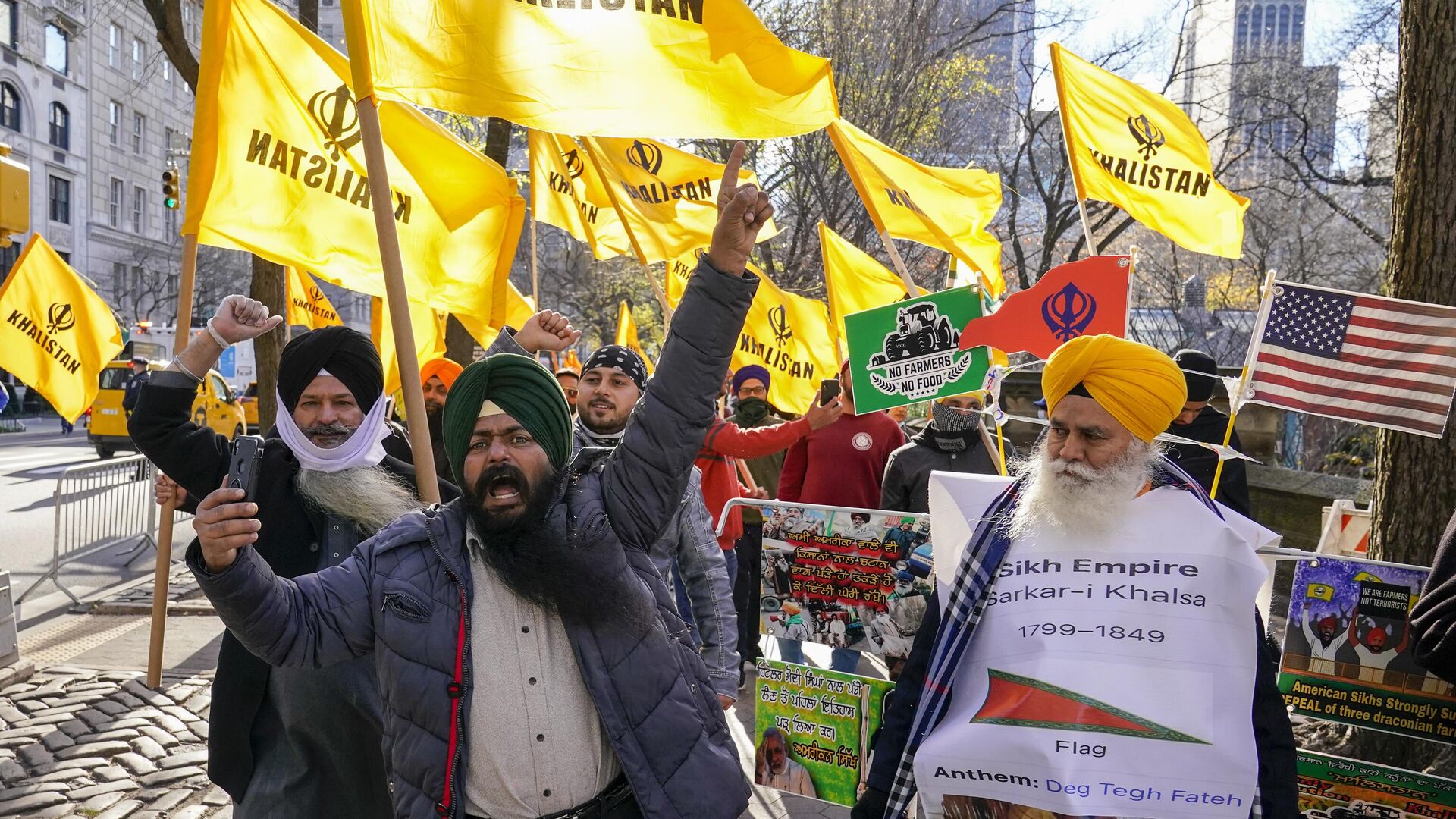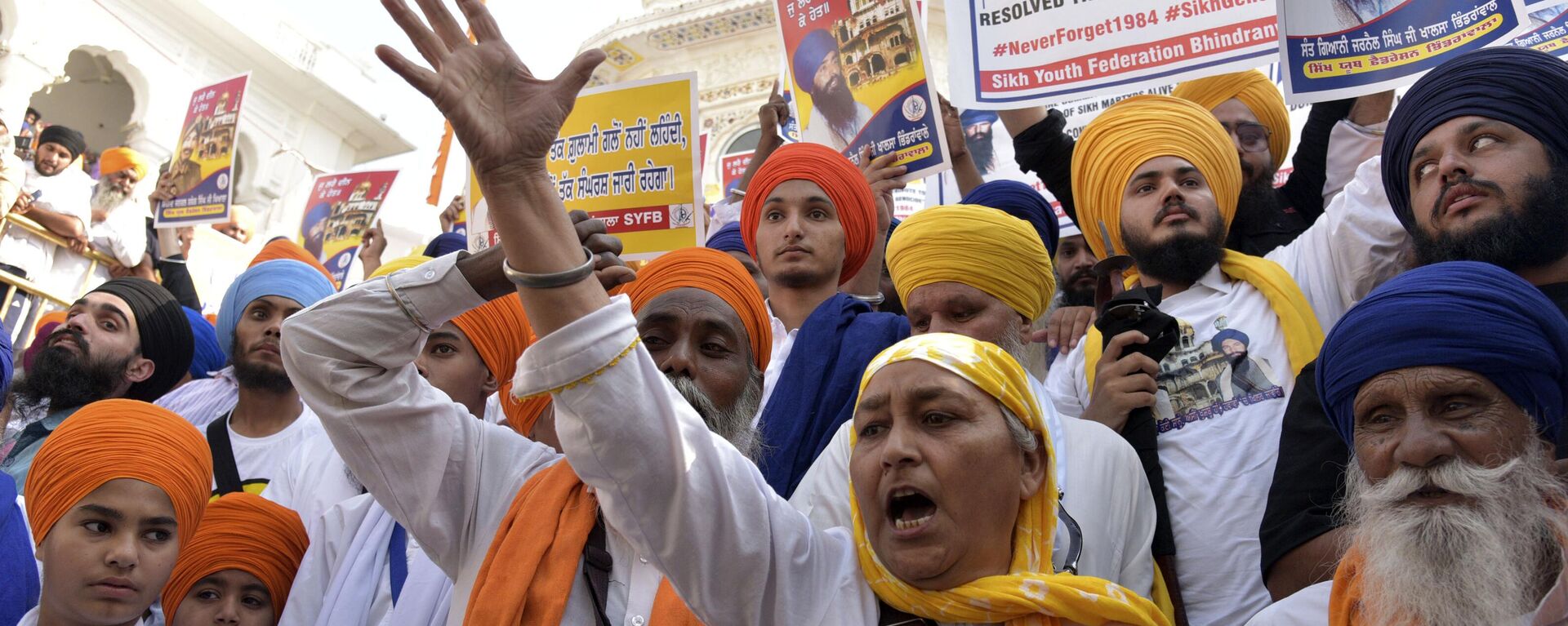https://sputniknews.in/20241203/experts-warn-of-rising-cyber-extremism-as-india-blocks-pro-khalistan-websites-8483881.html
Experts Warn of Rising Cyber Extremism as India Blocks Thousands of Pro-Khalistan URLs
Experts Warn of Rising Cyber Extremism as India Blocks Thousands of Pro-Khalistan URLs
Sputnik India
India has blocked over 10,500 social media URLs linked to the pro-Khalistan referendum in the past three years to prevent radicalization and safeguard national security.
2024-12-03T13:39+0530
2024-12-03T13:39+0530
2024-12-03T14:49+0530
world news
india
https://cdn1.img.sputniknews.in/img/07e7/09/13/4330404_0:160:3072:1888_1920x0_80_0_0_0fcbcca07b1c81d8b23a1542dcc4a6a0.jpg
Social media platforms, such as Facebook*, X (formerly Twitter), and YouTube, have become breeding grounds for Khalistani radical groups, signalling growing concern over the misuse of digital platforms for spreading extremist ideologies and conducting illicit activities, experts told Sputnik India.Cybercriminals are leveraging advanced technologies like artificial intelligence to spread extremist content with minimal effort, Pavan Duggal, a cyber-law expert and Supreme Court advocate, highlighted in a conversation with Sputnik India.Since social media platforms provide vast, easily accessible audiences, it is easy for extremist groups to influence or manipulate people for ideological and political gain and promote certain agendas, Mukesh Chaudhary, a cybercrime consultant and CEO of Cyberops Infosec, told Sputnik India. He cited the example of the 2020 farmers' protests in India, which also had the support of many Khalistani radicals in various countries.The rise of private messaging apps and encrypted channels complicates efforts to trace and neutralise extremist content, Chaudhary explained. He noted that investigators often create fake accounts to infiltrate private groups, but the process is slow and requires international cooperation, which is further hindered by differing national laws.Cyber extremism poses a significant challenge for law enforcement in tracing activities and moderating content on global platforms, especially regarding sensitive issues like the Khalistan referendum, Duggal pointed out, adding that Internet jurisdiction and the application of uniform community standards complicate matters.While freedom of speech is protected, those promoting harmful or illegal content must face consequences if they violate platform policies, Chaudhary suggested.Moreover, the varied laws of the social media companies in different countries make investigation difficult.To address these issues, experts advocate for regular "cyber patrolling" to monitor suspicious online activity, similar to traditional police patrols. This would involve establishing dedicated cyber units at the district level for continuous monitoring of social media.Experts also stress the urgent need for a national social media policy in India that would ensure digital platforms comply with the state laws and corporations while investigating cybercrime and dealing with extremist content.* Meta products banned in Russia for extremism
https://sputniknews.in/20240213/pro-khalistanis-seek-to-use-farmers-protest-to-promote-agenda-6534036.html
india
Sputnik India
feedback.hindi@sputniknews.com
+74956456601
MIA „Rossiya Segodnya“
2024
Sangeeta Yadav
https://cdn1.img.sputniknews.in/img/07e6/0c/0f/110602_0:0:641:640_100x100_80_0_0_c298016a79eb02ef8caa9d1f688c12a5.jpg
Sangeeta Yadav
https://cdn1.img.sputniknews.in/img/07e6/0c/0f/110602_0:0:641:640_100x100_80_0_0_c298016a79eb02ef8caa9d1f688c12a5.jpg
News
en_IN
Sputnik India
feedback.hindi@sputniknews.com
+74956456601
MIA „Rossiya Segodnya“
Sputnik India
feedback.hindi@sputniknews.com
+74956456601
MIA „Rossiya Segodnya“
Sangeeta Yadav
https://cdn1.img.sputniknews.in/img/07e6/0c/0f/110602_0:0:641:640_100x100_80_0_0_c298016a79eb02ef8caa9d1f688c12a5.jpg
cyber extremism, pro-khalistan, urls, 10,500 social media urls, pro-khalistan referendum, radicalization, safeguard national security, facebook, telegram, farm law, farmers protest 2022, x,
cyber extremism, pro-khalistan, urls, 10,500 social media urls, pro-khalistan referendum, radicalization, safeguard national security, facebook, telegram, farm law, farmers protest 2022, x,
Experts Warn of Rising Cyber Extremism as India Blocks Thousands of Pro-Khalistan URLs
13:39 03.12.2024 (Updated: 14:49 03.12.2024) India has blocked over 10,500 social media URLs linked to the pro-Khalistan referendum in the past three years to prevent radicalisation and safeguard national security.
Social media platforms, such as Facebook*, X (formerly Twitter), and YouTube, have become breeding grounds for Khalistani radical groups, signalling growing concern over the misuse of digital platforms for spreading extremist ideologies and conducting illicit activities, experts told Sputnik India.
Cybercriminals are leveraging advanced technologies like artificial intelligence to spread extremist content with minimal effort, Pavan Duggal, a cyber-law expert and Supreme Court advocate, highlighted in a conversation with Sputnik India.
"Cybercriminals obliterate their electronic footprints to make it difficult for law enforcement to trace them. They get paid for disseminating extremist content and have no moral qualms in spreading harmful content," Duggal stated.
Since social media platforms provide vast, easily accessible audiences, it is easy for extremist groups to influence or manipulate people for ideological and political gain and promote certain agendas, Mukesh Chaudhary, a cybercrime consultant and CEO of Cyberops Infosec, told Sputnik India.
He cited the example of the
2020 farmers' protests in India, which also had the support of many
Khalistani radicals in various countries.
"During the farmers' protests, a toolkit was shared by Greta Thunberg that instructed protesters on how to use hashtags and post content effectively to gain attention. This reflects how individuals or groups can manipulate social media to advance political or ideological causes", Chaudhary said.
The rise of private messaging apps and encrypted channels complicates efforts to trace and neutralise extremist content, Chaudhary explained. He noted that investigators often create fake accounts to infiltrate private groups, but the process is slow and requires international cooperation, which is further hindered by differing national laws.
Cyber extremism poses a significant challenge for law enforcement in tracing activities and moderating content on global platforms, especially regarding sensitive issues like the
Khalistan referendum, Duggal pointed out, adding that Internet jurisdiction and the application of uniform community standards complicate matters.
"Platforms tend to prioritise freedom of speech, but this can't come at the cost of national security. These platforms need to recognise the impact their content can have on the sovereignty and integrity of nations", Duggal stressed.
While freedom of speech is protected, those promoting harmful or illegal content must face consequences if they violate platform policies, Chaudhary suggested.
"Some users post controversial content in the form of questions or ambiguous language to avoid detection. Criminals and extremists are well-versed in using these tools and also research on the policies of social media companies to avoid detection", Chaudhary explains.
Moreover, the varied laws of the social media companies in different countries make investigation difficult.
To address these issues, experts advocate for regular "cyber patrolling" to monitor suspicious online activity, similar to traditional police patrols. This would involve establishing dedicated cyber units at the district level for continuous monitoring of social media.
Experts also stress the urgent need for a national social media policy in India that would ensure digital platforms comply with the state laws and corporations while investigating cybercrime and dealing with extremist content.
In the past three years, the government has blocked over 28,000 URLs across different social media platforms.
* Meta products banned in Russia for extremism



